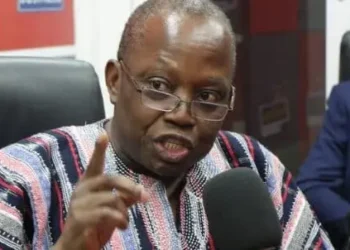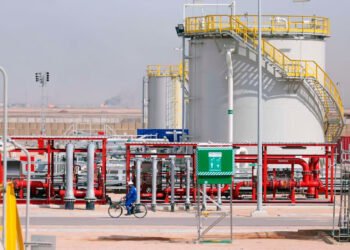The Government of Ghana’s decision to reject the lease extension application for the Damang Main Mining Lease, operated by Abosso Goldfields Limited — a subsidiary of Gold Fields Ghana — is attracting growing public scrutiny and calls for transparency.
The rejection, which will compel Gold Fields to cease operations at the Damang site by April 18, 2025, has raised serious concerns from industry experts, local communities, and investment stakeholders.
One of the most vocal critics of the government’s handling of the matter is renowned mining consultant Ing. Wisdom Edem Gomashie, has called on the government to provide detailed justification under the Minerals and Mining (Licensing) Regulations, 2012 (L.I. 2176) to uphold accountability and investor confidence.
“Such a major decision, with direct implications for employment, investment, and Ghana’s global mining reputation, must be grounded in a transparent legal basis and accountability to the people of Ghana.”
Ing. Wisdom Edem Gomashie, Mining consultant
Gold Fields Ghana reportedly submitted the lease extension application in December 2024, well within the 90-day regulatory window before expiration. Despite this, the government rejected the application without publicly outlining any breaches or failures by the company.

Ing. Gomashie questioned whether the rejection is based on a violation of regulation 191(2), such as the submission of misleading information, or non-compliance with obligations under the 2016 Aboso Development Agreement.
He further called on the Minerals Commission and the Ministry of Lands and Natural Resources to disclose whether the rejection adhered to procedures outlined in Regulations 192 and 194 of L.I. 2176.
Ing. Gomashie emphasized, “If the applicant has defaulted in any way, the specific breaches or issues of non-compliance must be clearly communicated to the public.”
The Damang Mine, which contributes approximately 6% of Ghana’s large-scale gold production, currently employs around 1,452 workers, including 204 core employees and 1,248 contractors — with 75% of the workforce sourced from the local community.
The site also maintains a 12% female workforce participation rate, which is notably high in the mining industry.
The closure of the mine not only threatens livelihoods but also risks destabilizing the economic fabric of host communities in the Prestea-Huni Valley Municipality, where the mine has long served as a critical economic pillar.
“A sudden rejection poses a significant risk of major job losses and destabilization of the community.
“Stakeholders within the Damang Lease host communities must be engaged as soon as possible.”
Ing. Wisdom Edem Gomashie, Mining consultant
Mining Risks to Investor Confidence

Beyond the local impact, Ing. Gomashie warned that Ghana risks eroding investor confidence and potentially facing international arbitration, citing precedents in Tanzania, where the International Centre for the Settlement of Investment Disputes (ICSID) awarded over US$200 million in damages to mining companies affected by state interference.
He noted, “Gold Fields Ghana Limited may seek redress through international arbitration,” referencing Section 27(3)(b)(II) of the Minerals and Mining Act, 2006 (Act 703).
The concern is further compounded by perceptions of state capture and potential favoritism. Gomashie cautioned against using the lease expiration as a smokescreen to allocate the resource to preferred private or political interests.
Ing. Gomashie remarked, “It appears a meal is cooked and to be served through tender,” alluding to the possibility of the Damang lease being reassigned without fair competition.
Should the rejection be upheld, Ing. Gomashie advocates for a competitive and transparent tendering process to reallocate the lease.
He insisted that Gold Fields Ghana must be allowed to participate in any future bidding and that the process must be devoid of political manipulation.
“The reallocation of such a strategic asset must reflect the highest standards of public interest, technical capacity, financial capability, and social acceptance.”
Ing. Wisdom Edem Gomashie, Mining consultant
He also stressed the importance of vetting potential new leaseholders to avoid another repeat of failed transitions, such as the Golden Star Prestea-Bogoso mine takeover by Future Global Resources (FGR), which left workers and the mine dormant for extended periods.
So far, the Ministry of Lands and Natural Resources has remained silent on the matter, declining to provide further details about the rejection or whether new bidders are being considered.

The Minister, Hon. Emmanuel Armah Kofi Buah, has been urged to explain the rationale either through Parliament or public address.
“Silence on this matter will only deepen suspicions and weaken confidence in Ghana’s mining governance framework.”
Ing. Wisdom Edem Gomashie, Mining consultant
As Ghana stands at a crossroads in its mining policy and resource management strategy, stakeholders are calling for a reassessment of how mining leases are handled to promote transparency, fair play, and sustainable development.
Ing. Gomashie proposed that if localization is the government’s strategic aim, it must be implemented inclusively, allowing all capable Ghanaian entities to bid competitively.
“A possible tendering of that lease should not be skewed towards a desired interest at all costs.
“Let us act in a way that reassures investors, communities, and citizens that the rule of law governs mining in Ghana.”
Ing. Wisdom Edem Gomashie, Mining consultant
With the April 18 deadline fast approaching and production at the Damang site already winding down, the spotlight is now firmly on the government to either explain its position or risk long-term reputational damage to Ghana’s investment environment.
READ ALSO: Ghana, Czech Republic Deepen Ties with President Petr Pavel’s Visit



















